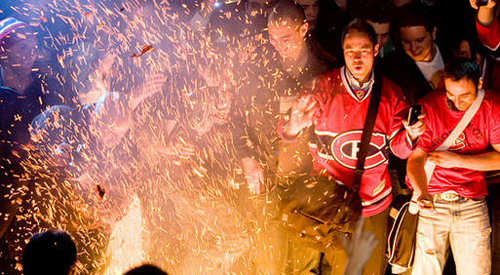
Habs fans: passionate or rambunctious?
In stark contrast to last spring, the streets of Montreal are quiet.
There is no boisterous crowd; no chanting, no cheering. There isn’t a mob of ebullient people marching down Sainte-Catharine Street chanting “ole, ole, ole.” Most importantly, especially for Montreal Police, there are no cars on fire, no smashed windows, no looting and no mayhem.
In 2008, Montreal Canadiens fans took to the streets to celebrate an opening round victory over their historic rivals, the Boston Bruins. Rioters damaged police cars, smashed store windows, and stole anything they could grab. Similarly, after last season’s second-round upset of the heavily-favoured Pittsburgh Penguins, residents once again looted downtown businesses. Approximately 30 people were arrested, according to CBC.
Surprisingly, rioting after a championship is not a novel occurrence.
After Montreal’s last two championships in 1993 and 1986, crowds poured out onto the streets and committed acts of vandalism and violence, causing a copious amount of damage. This phenomenon isn’t isolated to just hockey, nor Montreal. Numerous incidents from all major sports happen every few years, but rarely, if ever, do they occur after victories in the opening two rounds.
Overall though, history seems to be repeating itself as Montreal has a long history of hockey-related violence.
In 1955, the most famous Habs-based riots broke out on St. Patrick’s Day after the leaguesuspended Maurice Richard for the remainder of the season after hitting a linesman. Tensions in the city only subsided after Richard himself made a personal plea by accepting his punishment and vowing to return the next season and help the Canadiens capture Lord Stanley’s cup.
[php snippet=1]
Montreal’s history of sporting violence led GQ to name them the 11th worst fans in America (technically, North America).
In addition to the aforementioned riots, the magazine also cited Montreal fans booing the US national anthem and the Bell Centre’s penchant to turn on Montreal’s own players.
Stu Cowan, whose office at the Montreal Gazette has been right in the thick of things during both riots and celebrations, generally disagrees with GQ‘s sentiments.
As the newspaper’s sports editor since 2002 and lifelong Montreal resident, he feels that the label of fans being unruly is a bit exaggerated and misdirected. He noted that the negativity towards the US national anthem came from a pocket of 20-30 fans in the nose bleed sections, not the 20,000-plus others. The riots, he said, mainly involve “punk kids”.
Cowan doesn’t agree with the “11th worst” label, rather he sees the fan base as one of the more passionate in all of sports and perhaps the most passionate in the NHL.
What the men’s fashion magazine fails to acknowledge is that the Canadiens have consistently sold out home games over the years and, most recently, finished first in average attendance six times over the past decade while never ranking lower than second.
In Montreal, sports fans also have the CFL’s Alouettes to follow. However, the scene is a little one-sided in terms of fan and media backing.
“In reality, it is the only game in town,” said Cowan of the Habs while mentioning that the Alouettes do well in their own right but are up against stiff competition.
Not only do the Canadiens consistently sell-out, but the Bell Centre is one of the loudest, most raucous buildings in the league. Their trademark chant of “ole ole ole”, appropriated from Spanish football, rings loud throughout the building and has the unique ability of being both motivating and taunting. It combines the galvanizing qualities of the standard “Go Team Go” chant with the derisive nature of the infamous “hey, hey, hey, goodbye” chant that serenades eventual losers.
Recently, the leaders of Canada’s main political parties decided to move the date of their French language debate because it conflicted with the Canadiens’ opening round match-up with the Bruins. This switch highlights just how important the Habs are to Quebec culture.
“The fans here carry their emotions on their sleeve. [With all the media coverage,] it’s a 24/7 soap opera,” Cowan said.
The Canadiens take precedent over virtually everything else in Quebec. Hockey is life. And in Quebec, the Canadiens are hockey.
Former Mayor of Montreal, Jean Drapeau, is famous for saying that the Stanley Cup parade will take its usual route. Now, Cowan said, people joke that the riot will take its usual route.
[php snippet=1]

